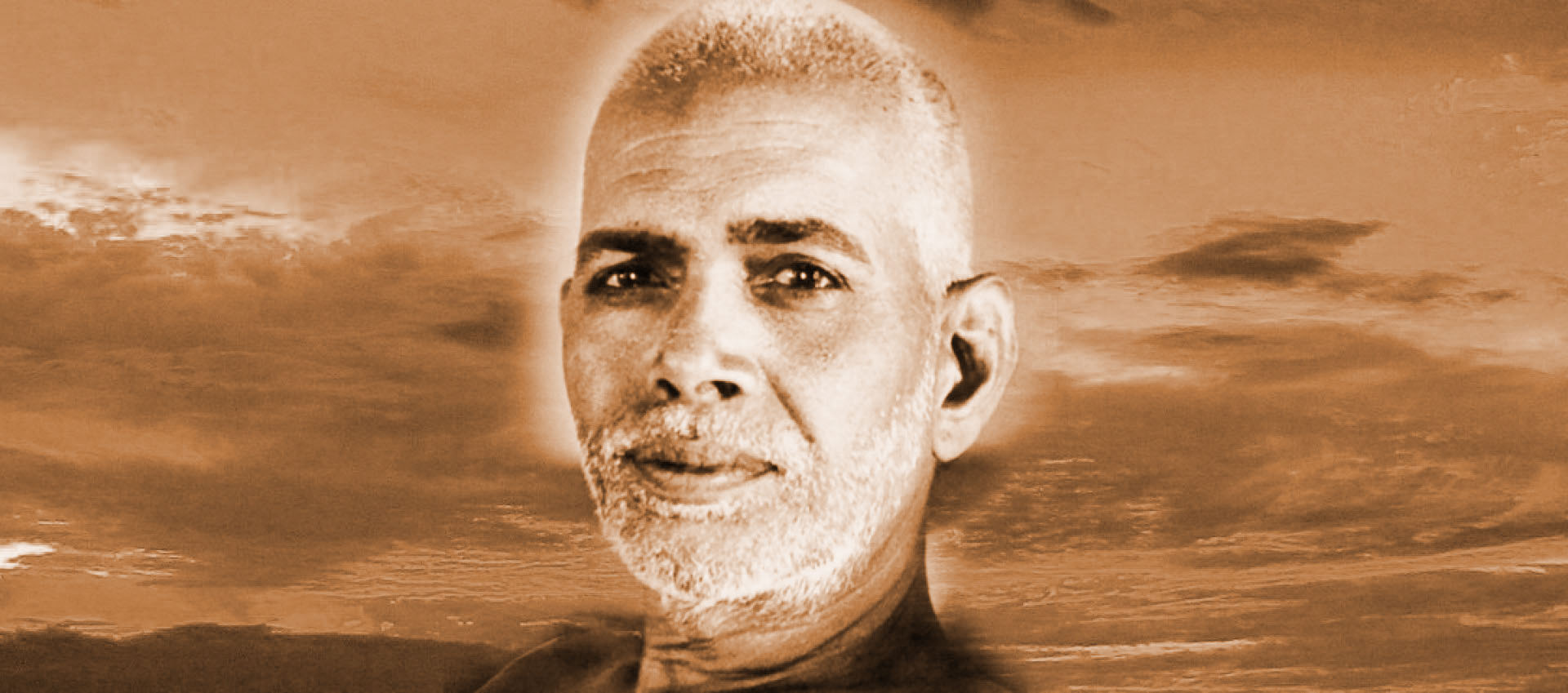
Wonderful Guidance with Ramana
Krishna Bhikshu (Voruganti Krishnayya) had a degree in law, but he rarely practised, and preferred to devote his life to spiritual pursuits. He authored Ramana Leela, an authoritative biography of Sri Ramana in Telugu, and Ramana Yoga Sutras, which contains teachings of the Maharshi. He was also attracted to Sri Aurobindo, but in 1931 he finally decided that Sri Ramana was the guru he had been seeking.
Krishna Bhikshu narrates the teachings and experiences he received with Sri Ramana Maharshi.
When in Madras preparing for my law degree, I met Ganapati Muni whose very appearance was striking. “If the man is so great, how much greater must be his master,” I thought. I went to Sri Ramanasramam with a friend. As we arrived, Bhagavan was washing his hands after the meals. Looking at us lovingly and earnestly, he enquired, “Have you had your food yet?” To our reply that we had it in the town, he said, “You could have had it here.”
The three days’ stay made a great impression on me. I considered Sri Ramana to be a real Mahatma. I went to Benaras for a month, returned to Pondicherry and spent five months there. Wherever I would go people would find some fault or other with me. Only Bhagavan asked for nothing, and found fault with nothing. As a matter of fact, there was nothing in me which entitled me to his grace. But this did not matter with Bhagavan. He wanted me, not my goodness. It was enough to tell him ‘I am yours’, for him to do the rest. In that way he was unsurpassed.
To me Bhagavan was always a great and fatherly man. I trusted him completely. He guided and I followed. I knew I was in safe hands and I was well looked after. I just loved him with the whole of my being and lived my life by his side, eating in the same room, sleeping in the same hall, chatting and joking, but all the time being tied fast to him by his immense love and attention. I am saying this without pride for, as he was to me, so was he to all. Everybody felt connected to Bhagavan in some special, indescribable way that was somehow unique. We all felt special. Bhagavan loved us all, but each one differently.
With him I was like a child with his mother – completely safe, completely happy. Whenever in difficulty, I turned to him and he would solve my problem with ease. Even when I was away from him, it was enough for me to utter ‘Ramana’ and I felt his helping hand, which would banish all my troubles, internal and external. What attention I got whenever I went to the Ashram! He would ask me where I made my bed, what I used for a pillow and so on. (We used to have blocks of wood for pillows because they kept the head cool in the steamy summer nights.)
During one of my early visits to the Ashram, he had encouraged me to carry on repeating the Gayatri mantra, since I had been repeating it in the past. After sometime I asked, “Am I expected to know the meaning of the mantra, and meditate on it?” He said, “I have only asked you to see who is repeating the Gayatri or who is the one doing japa.” By making me look for the one who was doing the japa, he was subtly and slowly turning me towards the practice of self-enquiry.
Nobody could correctly guess the way Bhagavan would meet or treat people. The high and mighty of the land might not even get a blank look, while some insignificant wanderer would become the object of his concentrated attention for hours or even days. Once Pranavananda Swami came to the Ashram. Being utterly exhausted he sat on the steps. When Bhagavan was told about it, he came out, sat at the feet of Pranavananda and started rubbing his legs, saying, “You had a long way to walk thatha; your legs must be paining very much.” The old swami protested in vain. Bhagavan had his way and massaged the swami’s feet. Nobody knew what great merit the old man had amassed to be the recipient of this great fortune.
At meal time, Bhagavan would ask to be served very little, and he would carefully clear the leaf-plate of the last grain of food before getting up. I once remarked, “If we clear our dining leaves so scrupulously, the dogs, cats, monkeys, rats and ants will starve.” Bhagavan’s response was, “If you are so compassionate, why not feed the animals before taking food yourself?”
Bhagavan’s kindness and solicitude also extended to the vegetation. Once the sarvadhikari of the Ashram asked a workman to clear the dead leaves of an almond tree. He started chopping right and left. Bhagavan called out the man. “Hey, you are torturing the tree too much. Don’t you know it is alive? Imagine what would happen if I suddenly grabbed you by the hair and pulled. Your hair may have no life, yet you would feel it. Better leave the poor tree and go away.”
Bhagavan’s way was to influence rather than command. For example, he never ordered Devaraja Mudaliar to become a vegetarian. But when Mudaliar was not sure whether a vegetarian diet would contain adequate nourishment for him, Bhagavan assured him categorically that he would not suffer if he gave up non-vegetarian food.
Ramakrishna Swami, who had been serving Bhagavan for many years, started visiting a woman in the town. Her relatives caught him in her house, bound him hand and foot and locked him in a room. He managed to escape and came running to the Ashram, pursued by his enemies. When he entered the Ashram gate, they gave up the chase. He entered the hall trembling and fell on the ground shouting ‘save me, save me’. After Bhagavan had heard the man’s confession, he looked at the culprit with understanding and pity and said, “You don’t need to have this fear any longer. Go and sleep.”
The Ashram people requested Bhagavan to send the man away, for his presence would tarnish the good name of the Ashram. Bhagavan called the man and told him in front of everybody, “You have done some wrong, but you were too foolish not to keep it secret. Others do worse things, but they take care not to be caught. Now the people who were not caught want you to leave the Ashram because you were caught.” The person was allowed to stay.
Bhagavan’s standard prescription was to attend to one’s own faults and problems before turning to alleged defects of others. Once a socially-minded person told Bhagavan, “What I would like to do is to go round and set things right. I came to you for the strength and power to do this work.” Bhagavan said, “You are like a beggar offering to give a feast to all those who come. First set yourself right and only then, set out to improve others. But one must begin somewhere, and one can begin only with oneself.”
It is difficult to exaggerate the consideration of Bhagavan for the devotees. Dr. G. S. Melkote of Hyderabad was once treating Bhagavan for eczema but there was no improvement. The doctor had a sudden and urgent necessity to return home. He was filled with remorse at having to leave Bhagavan in that condition. I advised him to pray to Bhagavan to cure himself, which he did. From that night Bhagavan’s eczema responded to treatment. The doctor literally wept at this miracle that enabled him to leave without any compunctions.
Cow Lakshmi just could not spend a day without seeking Bhagavan’s company some time or the other during the course of the day. One day she came to the hall, went straight to Bhagavan and literally wept on his shoulders. For half-an-hour Bhagavan kept consoling her, saying, “Why are you so sad, dear mother? Am I not here to look after you?” and so on, till she was pacified.
A lawyer, R. Ramakrishniah from Nellore, came with a long list of questions. He was quite proud of his questions and was sure that even Bhagavan would find them difficult to answer. But when he came to the hall and sat before Bhagavan his mind became paralysed and he could not ask a single question.
Prof. Syed and his wife were great devotees of Bhagavan. They used to stay in a rented house outside the Ashram. One day Mrs. Syed felt a strong desire to invite Bhagavan to their house for food. She nagged her husband but he did not have the courage to ask for something so unusual. The bold lady went on pressing her husband until he got more afraid of her than of the enormity of her request. When he told Bhagavan about his wife’s desire, he merely smiled and kept quiet. But the wife would not give up. One day, while Bhagavan was going up the hill, the couple stood before him and Prof. Syed told him her desire. Bhagavan just laughed and went up the hill (Bhagavan never visits anyone).
When they returned home, there was quite an argument in the house. The wife blamed the husband because she felt that he had not asked Bhagavan in the proper way. At last, when they had had enough of the quarrel, he told her, “How am I responsible? The truth of the matter is, your devotion is deficient.” These words must have touched her deeply, for she sat in meditation throughout the night. She wanted by sheer intensity of her prayer to bring Bhagavan to dinner! During the early hours of the morning she must have dozed, for Bhagavan appeared to her in a dream or vision and told her, “Why are you so obstinate? How can I leave the Ashram and come to your house for food? I must dine along with the people there, otherwise they won’t eat.”
In her vision she saw three devotees. Bhagavan said in her dream, that these three devotees were to be fed, and it will be the same as feeding Him. These were: Dr. G. S. Melkote – a Kanarese and a well-known personality of Hyderabad, Swami Prabhuddhananda – a Bengali sannyasi, and myself – an Andhra bachelor. She gave full details of her vision to Prof. Syed, who promptly invited all the three people for food to his house. We were all Brahmins. Although we were delighted to represent Bhagavan at the feast, we were afraid of the reaction of the Ashram Brahmins (because traditionally Brahmins follow orthodox rules, and they cannot and don’t like to eat just anywhere, especially in a place where non-vegetarian food is prepared).
Dr. Melkote was in the guesthouse near the flower garden. I went to him and asked, “What are you thinking about this?” He said, “I am still thinking about it. They are Muslims. If we go, we are bound to get into a lot of trouble. The Ashram people may turn us out of the Ashram.” I told Dr. Melkote, “I am going because I take it as Bhagavan’s direct order. Otherwise how could Mrs. Syed pick us? How could she know our names and faces well enough to show to her husband?” Dr. Melkote replied, “Well, we are going, Bhagavan will attend to the risks.”
In spite of these brave words, Dr. Melkote was perplexed. What do Muslims know about the Brahmin rules and habits of cleanliness? Why should we trust the vision of some Muslim lady? Could we really say that we were obeying Bhagavan’s orders? Who would believe us?
The next day, when the bell for dinner was rung, we three went before Bhagavan and bowed. Bhagavan did not ask us the reason. He merely looked at us. Instead of going to the dining hall with the others, we marched out of the Ashram, passing before the sarvadhikari who, wonder of wonders, did not ask us why we were going out without eating food for dinner.
After getting everything thoroughly cleaned, Mrs. Syed had lovingly prepared dish after dish. We found the food excellent. At the conclusion of the meal she offered us betel leaves with her own hands. As we were walking back to the Ashram, Dr. Melkote had tears in his eyes. He said, “I come from Hyderabad, and I know well the Muslim ways and customs. A Muslim lady will give betel leaves with her own hands to nobody except her husband or a fakir. In her eyes we were fakirs, the forms Bhagavan took to go to her place.”
When we returned to the Ashram, we were astonished that no body had enquired why we had not been present in the dining hall, or where we had gone. How wonderfully does Bhagavan protect those who obey him!
Once I wrote a poem in praise of Bhagavan in which I said, “May you be with us in all your future births.” Bhagavan heard this and said, “Is this birth not enough, that he wishes me many more?” People scolded me for writing so disrespectfully. Some said Bhagavan was beyond rebirth. Others maintained he was the son of great Siva Himself, who was never in need of a human body. I exclaimed, “Bhagavan will be reborn many times, not because he needs it but because we need him.”
Bhagavan listened carefully. ‘Right’, he said, and became very quiet. The hall was filled with power and silence and immense love was pouring from Bhagavan like a mighty sea.

